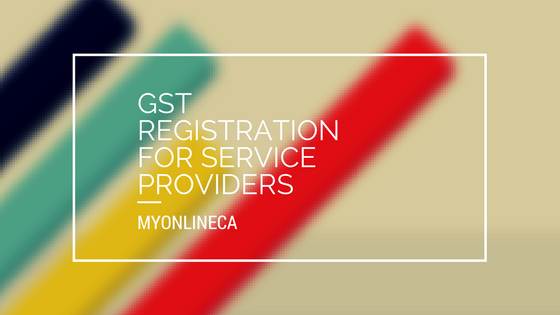In this guide we let you know about GST Registration for Service Providers. All the Service Providers have a different rules regarding the GST Registration. The Goods and Services Tax (GST) is a unified tax structure that was implemented by the Government of India on 1 July 2017. It is one of the most historic tax reforms in Indian Taxation History.GST is said to be a destination based or consumption based taxation.
GST guidelines related to registration have been made more user-friendly for service providers in the 23rd GST Council Meeting. In this article, we will highlight the turnover limit for service providers for obtaining GST registration.
Documents Required from Service Providers for GST Registration
The following documents are required for GST Registration:
- Valid Permanent Account Number (PAN)
- Valid Indian Mobile Number
- Valid e-mail address
- Place of business
- Valid Bank Account Number from India with IFSC
- At least one Proprietor/ Partner/ Director/ Trustee/ Karta/ Member with PAN
- An authorized signatory who is a resident of India with valid details including PAN
Get Low Cost GST Registration Service Offer
Fill-up below details and Get Proposal on your Email
Process of GST Registration for service providers
For those service provider who must obtain GST registration, the process is very simple:
- You need to access website GST.GOV.IN, click on login and you will be given a provisional ID and password for the purpose of enrollment in GST.
- Click on “New user login” to start GST Registration
- Login using your ID and password
- After logging in, you will be taken to a page where you enter your mobile number and mail address
- After entering the same, you will receive OTP on your mobile number and mail, enter the received OTP in OTP Field
- Create your desired username and password and Set security questions
India is a strong services-led economy with the sector generating a significant chunk of employment opportunities and contributing to the GDP. Service providers now have to grapple with a completely new set of facts. The implementation of the GST will bring some major advantages and disadvantages to the services industry. As GST is said to be a destination based tax, it might be a challenge to determine the destination of certain services. This may lead to a difficulty in determining state GST, central GST or inter-state GST on B2B and B2C transactions.
INTERSTATE AND INTRASTATE SERVICE PROVIDERS
If a service provider has operations in only one state then it is Intrastate Service Provider and GST is going to be without too much of compliance burden. But, if a service provider is operating in more than one state it is called Interstate Service Provider, and It would have operations in multiple states; then he has to take care of more compliance.
GST REGISTRATION FOR SERVICE PROVIDERS
Any business operating in India whether they deal with goods or services or both, if they have a turnover above the threshold limit that is set as a guide under the new GST regime has to get GST Registration. But there is certain omission to this general rule, where certain businesses are required to register under GST leaving out their turnover.
Threshold limit for GST Registration to Service Providers
Any business whose turnover surpasses the threshold limit of Rs. 20 lakhs will have to get registration under GST Law In India.
COMPULSORY REGISTRATION FOR CERTAIN SERVICE PROVIDERS
- OIDAR Service Providers
- E-Commerce Operators
- Non-Resident Taxable Person supplying services to Indian Residents
- Casual Taxable Person
SERVICE PROVIDERS – REGISTRATION IN MULTIPLE STATES
There has been much confusion when it comes to registration in different states and when does a service provider need to look at a multi-state registration. The Registration in multiple states is required when you have Business operations in a state, which is a place of business or office that you have to register in that state.
GST REGISTRATION –A MIXED BAG FOR MULTIPLE STATE SERVICE PROVIDERS
When you have service operations in more than one state of operation, you are required to obtain multiple registrations, you have to fully complete the compliance of each of those registrations, the invoicing has to be organized according to that state and therefore the input tax credit also becomes state-centric.
GST INVOICE FOR SERVICES
A Service Provider who has a GST Registration can issue invoices to the customers and can collect GST from its customers, In case if one does not have a GST Registration, they can issue a bill of supply without mentioning any GST.
Conclusion
GST has made doing business and trade very painless and smooth In India. The market size for every trader and Business Owners has grown. In reference to the service sector In India, GST has positive impacts like consolidating of taxes for inter-state service providers, clear differentiation between goods and services, input credit facility and made return filing consistent.

